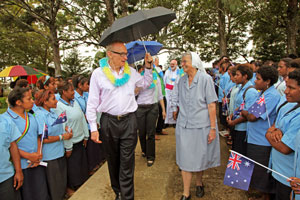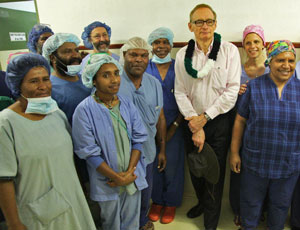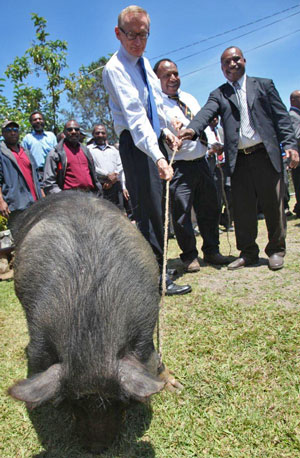Foreign Minister Bob Carr visited Papua New Guinea (PNG) from 3-6 December for the 21st PNG-Australia Ministerial Forum. During the visit Senator Carr made a number of announcements relating to the development program in PNG.
Family and sexual violence
Senator Carr announced that AusAID is supporting the Royal Papua New Guinea Constabulary to open another four Family and Sexual Violence (FSV) units at police stations in Alotau, Buka, Vanimo and Kundiawa.
The units are staffed by officers trained in victims' rights and provide a safe environment for victims of sexual assault and domestic violence to report offences. They can help victims access support services such as transport to courts, medical assistance, help with interim protection orders and safe housing.
The additional units bring the total number of AusAID-supported FSV units in PNG to 12 and form part of the aid program's broader strategy to both prevent and treat victims of family and sexual violence.
The new units will be opened by the end of January 2013 and will be complemented by training for more police officers. AusAID will also support the Office of the Public Prosecutor to strengthen its prosecution of family and sexual violence and to establish regional Victim Liaison Officers to support victims through the legal process.
There are three existing FSV units in Port Moresby, with units also located in Goroka, Mount Hagen, Lae, Popondetta and Kokopo. The units responded to more than 4,400 complaints of family and sexual violence in 2011.
Maternal and child health
During a visit to Mount Hagen Hospital in the PNG Highlands, Senator Carr announced that Australia will help improve maternal and child health outcomes by providing up to 1,400 health scholarships over the next three years. The scholarships are for study in PNG and aim to enrol 450 community health workers, 450 nurses and 500 midwives between now and 2015.
There are unacceptably high levels of maternal and child mortality in PNG and AusAID is working closely with the Government of PNG on the issue.
Senator Carr said about 1,500 women die during or soon after giving birth every year and one-in-five children will not reach their fifth birthday.
'With an ageing health workforce in PNG, the scholarships will help Australia to meet its commitment of training more than 1,400 midwives and health professionals by 2015,' Senator Carr said.
'This will contribute to an additional 8,000 births being supervised every year, which greatly reduces the risk of death in childbirth when complications arise.
'In PNG, poor maternal and child health indicators are compounded by remoteness and isolation, not enough health workers and poor quality drugs. Australia's support is focused on getting more better-trained birth attendants and community health workers, distributing essential medication to every health centre and boosting emergency care when there are inevitable complications,' he said.
The scholarships will be delivered under the Australian Regional Development Scholarships program and will cost around $66 million.
Basic education
Senator Carr announced a $12 million Australian contribution to free education for children from remote and disadvantaged backgrounds, during a visit to a school in the PNG Highlands.
Senator Carr said the funding would provide tuition fee subsidies to more than 6,000 elementary schools.
'Education offers hope and opportunity for tens of thousands of PNG children and their families,' Senator Carr said.
'Tuition fees have impeded the spread of education in rural and remote PNG, particularly among girls. The average length of schooling in PNG is four years, with adult literacy at around 60 percent.
'Australia's funds will go directly to schools to deliver the basics of reading and arithmetic. This is what Australians do–supporting our regional neighbours with basic education and services to help lift communities out of poverty.'
In 2013, the Government of PNG has allocated approximately $300 million for school subsidies and equipment. Australia has contributed $35 million in support for PNG's tuition fee free education policy since 2010, supporting more than 535,000 elementary school children to receive an education.
Funding covers teacher training, textbooks and basic school materials, to allow schools to operate without incurring substantial funding shortfalls. Australia is also funding the construction of 1,100 classrooms and 450 teacher houses, water tanks and ablution blocks, as well as four million textbooks by 2015.
More information
Media releases [external website]
- The 21st Papua New Guinea – Australia Ministerial Forum
- Reducing sexual and domestic violence in Papua New Guinea
- Reducing child and maternal death rates in Papua New Guinea
- Supporting basic education in PNG



